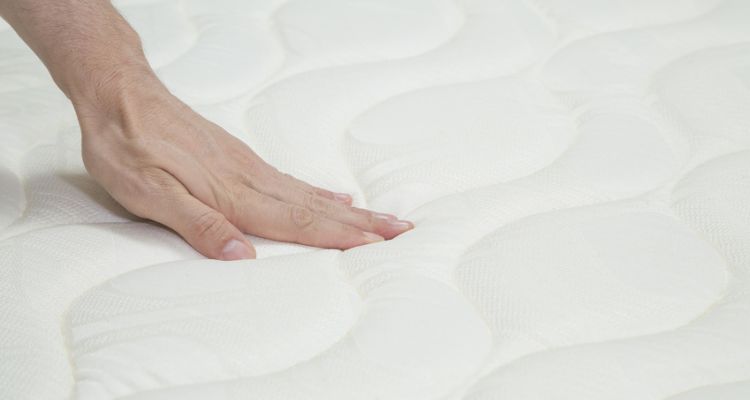You don’t need prior experience or a wise age to realize your sleep’s importance. Even if a baby does not sleep well, it becomes a nightmare for the parents. As you age, you start appreciating the various aspects of a mattress, and it is undoubtedly vital that you do. Your sleeping style is essential to deduce what mattress is best for you.
Similarly, the room, the budget, the space, and many other elements are necessary to consider. The most important one is firmness. Whether a soft mattress will be your pick or a firm one? And then, what level of firmness will you enjoy the most?
There are many bases to cover, and we have them all for you. Read on to find out the answer.
How Do You Tell If My Mattress Is Too Firm Or Too Soft?
It can be either for a new mattress or the current one. For a new one, the most common way is to ask the manufacturer or read the features of a mattress. But if it’s already in use, the question is how soft or firm a mattress is for you (also check the top rated extra firm mattresses).

You may not realize it, but a mattress’s surface may respond differently. A firm one may become soft for your back’s alignment over time. A soft one may be causing other issues which usually are not accompanied by it.
It is easy to work out if your mattress is too firm or soft. If you wake up with achy joints or a stiff back, your mattress may be too firm. It may be too soft if you find yourself sinking into your mattress and struggling to get comfortable.
The best way to determine if your mattress is the right firmness is to work out how restful your sleep is. Any discomfort while sleeping or in the morning means your need to change the mattress.
Ways to Tell If Your Mattress Is Too Soft
Persistent Morning Backaches
A soft mattress can cause serious health problems like morning back pain. It doesn’t provide the support your spine needs while you sleep. Investing in a firmer mattress will help you avoid these issues and get a better night’s sleep.
Sleeping Discomfort
If your sleep is not consistent and you feel uneasy, it’s evident that your muscles are not relaxing enough. This could be because your mattress is too soft. It can lead to conditions like insomnia or aches in various body parts.
If you’re finding it hard to sleep comfortably, it might be time to consider a new mattress (check the most comfy mattresses). Continuously trying to adjust the bed to find a suitable position means your mattress is too soft.
Unceasing Neck and Shoulder Pains
If your favorite sleeping position is lying on your stomach, but you encounter issues, then be alert. A stiff or aching neck and shoulder pain mean your mattress lacks firmness. Sleeping on your back puts strain on your neck, spine, and shoulders (check the best selling mattresses for back sleepers).
The consistent pain, maybe because your hips are sinking too deeply into the mattress. Your body is missing the alignment it needs to avoid such issues. A firmer mattress will provide more support and can help alleviate this pain.
Even if you are a side or a stomach sleeper, lousy posture will result in aches and pains. The upper and the lower body sink in differently on a soft mattress causing unceasing neck and shoulder pains (check the best selling mattresses for shoulder pain). It is mentioned in URMC’s Encyclopedia that good sleeping posture is important.
Trouble Getting In And Out of Bed
It may be difficult for the elderly or those suffering from knee pain to get in and out of bed. When you sit on your mattress, you should be able to stand off it easily. But a soft mattress sinks under your weight, and people with joint pains must put in extra effort to stand up.
A mattress should never cause discomfort! But if you find it difficult to get in and off the bed, it’s a sign that the mattress lacks firmness.
You Can Feel the Bottom Layer of Your Mattress
Most high-end mattresses have three or more comfort layers. The top layer is for breathability. The second layer is bouncy for comfort. With additional layers, the last one is usually for support.
The upper layers ensure your body is cradled and contoured as they follow the curves of your body. The bottom layers are down below and are hardly felt by anybody. They are assembled only to support the rest of the layers. However, if you can feel the hardness of the supportive layer, then your mattress is sagging and has become too soft.
Feeling Draggy During the Day
Sleeping through the night is a sign of good quality sleep. It makes your morning more productive, active, and healthier. But if you start feeling the opposite, like exhausted, irritated, and dull, then it’s your mattress to blame.
A normal adult needs 8 hours of sleep. If you are not getting those, then it’s not enough. Less sleep or disturbed sleep will negatively influence your health and productivity during the day.
Signs That Can Tell If Your Mattress Is Too Firm
Your Mattress May Be Too Firm If You Wake Up With Back, Neck, Or Shoulder Aches
A common problem with a firm mattress is uneven weight distribution. The mattress presses against the body, and there is no pressure release. This makes the body feel more agitated rather than relaxed. There is no contouring because of the firmness of the surface of the mattress. Hence, your body does not loosen up, and you end up with aching body parts.
If You Suffer Numbness or Tingling In Your Arms and Hands
Waking up a few times in the night to a numb arm or tingling foot can be disorienting and even a little scary. When you’re in that drowsy state between sleep and wakefulness, it can be hard to figure out what’s happening. This experience is often caused by a wrong sleep position or a mattress too firm.
A firm mattress doesn’t distribute equal body weight. It does not relieve pressure from the points where you interact with the mattress the most. The result is stressful sleep, with many suffering from numbness.

Wake Up Exhausted
A domino effect of other problems is because of sleepless nights. It can lower immune function to aching joints or even feeling exhausted every morning.
If you’re trying to find a comfortable position by tossing and turning at night, it’s unlikely you’ll get a good sleep. Your mattress is different from your liking, it is too soft, and you need to sleep well. Thus your mornings begin with you already feeling exhausted.
The Mattress Does Not Mold Your Body
A firm mattress cannot provide pressure point relief. Some contact points of your body need to relax on the mattress. These pressure points get tensed when they cannot sink in on the mattress (check 8 amazing mattresses for pressure points).
The weight pushing them down gets countered by the firmness of the surface pushing back up. The result is an aching body because the mattress does not provide contour or mold to your body.
Mattress May Be Substantial
A heavy and sturdy mattress sounds long-lasting, but the comfort level is very low. A mattress with good construction has some breathability to keep off molds and mildew. There should be a generous amount of ventilation for the body heat to escape.
The mattress’s layers should provide support and keep your body cool. It is useless if a substantially built mattress is committed to keeping it in good shape. The construction of the mattress plays a vital role, as mentioned in PubMed.
Is It Better To Sleep On A Softer or Harder Mattress?
Whether the mattress should be soft or firm depends on personal preference. Some people find that a softer mattress is more comfortable and helps them to get a good night’s sleep. At the same time, others find that a firmer mattress provides better support and prevents them from tossing and turning.
It also depends on the age of the sleeper and the side they sleep on. For example, babies must sleep on a firm mattress. A mattress that is too soft can cause choking hazards for infants. It is also mentioned in CDC that babies should sleep on firm mattresses.
Overall, besides being precautious, you should get a restful sleep and wake up with a pleasant feeling.
What Happens If The Mattress Is Too Firm?
- If your mattress is too firm, it can cause several problems.
- It can be uncomfortable to sleep on, as it will not support your body. This can lead to restless nights and a lack of energy during the day.
- A too-firm mattress can cause back and neck pain, as your body cannot relax properly.
- A firm mattress can make it challenging to get in and get out of bed, as you will have to use more effort into moving around.
How Long Does It Take To Get Used To A Softer Mattress?
People have different experiences when getting used to a softer mattress. If you’re used to a firm mattress, it can take a little while to turn things around. It may feel like you’re submerging inside the layers of the mattress, which can be uncomfortable at first. It depends on factors such as how used to a firmer mattress they were to begin with.
However, most people adjust to a softer mattress within a few nights and find it quite comfortable. It’s important to give yourself a little time to adapt to the new mattress before making a final decision. Some people may never fully get used to a softer mattress, but it can still be comfortable. It’s essential to try out different mattresses and find what works best for you.
How Do I Know If My Mattress Is Firm Enough?
Determining if your mattress is firm enough requires analyzing a few aspects. First, consider your sleep habits. If you sleep primarily on your back, you’ll likely need a firmer mattress to support your spine. If you sleep mainly on your side, you’ll need a less firm mattress to contour your body.
Consider your weight. A heavier person will need a medium firm mattress to support their weight, while a lighter person won’t enjoy the hard surface. For an average height and weight fellow, it comes down to preference. Some people prefer a softer mattress for comfort, while others prefer a firmer mattress for support. Ultimately, it’s up to you to decide what firmness level is best for you.
Your mattress should be firm to support your body weight and provide adequate comfort. However, consider a firmer option if you are sinking into your mattress or experiencing discomfort.
Key Takeaways
Recognizing the Importance of Mattress Firmness
Your quality of sleep significantly depends on your mattress’s firmness level. Identifying whether your mattress is too soft or too firm can impact your health, productivity, and overall well-being. The delicate balance between softness and firmness is essential for restful sleep, and understanding its nuances can lead to better sleep habits.
Indications of a Mattress Being Too Soft
Persistent morning backaches and general sleeping discomfort are common signs of an overly soft mattress. When you encounter difficulties getting in and out of bed, feel the bottom layer of your mattress, or experience fatigue during the day, it’s a clear indication that your mattress may lack the necessary firmness.
Warning Signs of a Mattress Being Too Firm
Waking up with back, neck, or shoulder aches or experiencing numbness or tingling in your arms and hands can be attributed to an excessively firm mattress. The inability of a mattress to mold to your body or feeling exhausted upon waking are further indicators of a mattress being too rigid for your needs.
Finding the Ideal Firmness Level
The perfect firmness level is subjective and varies based on personal preferences, sleeping positions, and individual health requirements. It’s essential to understand your body’s signals and identify whether you need a firmer or softer mattress to achieve restful sleep.
In Conclusion
The nature of sleep you get at night is greatly determined by the mattress you sleep on. A comfortable mattress should strike a perfect balance between being soft and firm. If you constantly wake up with an aching body or you’re experiencing sleeping discomfort, it might be time to check your mattress.
Mattresses can become soft over time or become too firm and lose their softness. If that’s the case, you’ll need to upgrade to a new mattress. Regularly rotating your mattress will distribute the weight evenly across the surface and make it last longer.
References:
https://www.urmc.rochester.edu/encyclopedia/content.aspx?ContentTypeID=1&ContentID=4460
https://pubmed.ncbi.nlm.nih.gov/25520997/
https://www.cdc.gov/vitalsigns/safesleep/infographic.html
How to tell if mattress is too soft or firm FAQs
Can Too Soft of A Bed Hurt Your Back?
This depends on an individual's physiology. With different body structures and mass, everyone experiences different levels of comfort. However, some believe that sleeping on a very soft bed can put more strain on your back.
This may be because the back and the spine do not receive the necessary support. So, consider a firmer mattress if you already struggle with back pain.
Why Do Chinese Sleep On Hard Beds?
The Chinese have a long history of sleeping on hard beds. This is because hard beds are considered good for the spine and overall health.
Additionally, hard beds are thought to promote better sleep by preventing tossing and turning. Therefore, many Chinese people believe sleeping on a hard bed is the key to a good night's sleep.
Can Side Sleepers Use Firm Mattresses?
Side sleepers often prefer firmer mattresses because they support the hips and shoulders more. This can help to prevent pain in these areas and can also help to keep the spine in alignment.
Some side sleepers find that softer mattresses are too plush and cause them to sink too deeply, exacerbating pain. For these people, a firm mattress is often the best choice.

